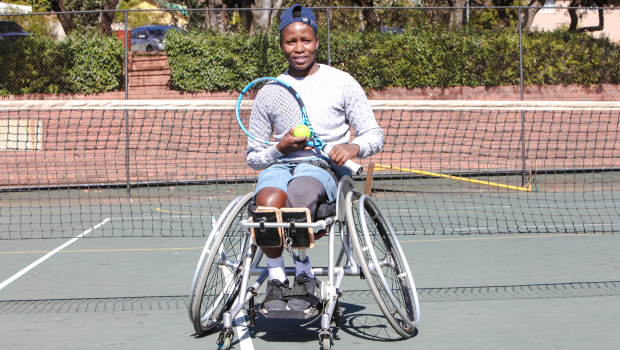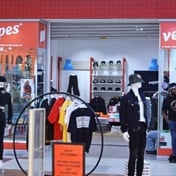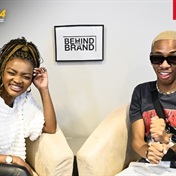
Those kids could never have imagined where Kgothatso Montjane would be now: a celebrated sports star making headlines in a sport where she competes on the same stage as her all-time idol, Serena Williams.
The feisty 32-year-old left-hander has turned her disability into a triumph, travelling to the world’s top tennis tournaments and playing her heart out to become one of the best in the business. And never was this more obvious than at Wimbledon earlier this year.
Kgothatso travelled to London all alone without even a coach to cheer her on yet she went all the way to the semifinals of the wheelchair category, losing to Diede de Groot of the Netherlands.
But it was enough to make her a national heroine – and cement her place in the history books as the first black South African woman to represent both her country and the continent on the grass courts of the famous All England Club.
READ MORE: How much the first black South African woman to play at Wimbledon got in prize money
Making her feat all the more remarkable is the fact it was her first tournament on grass.
“I couldn’t prepare properly because where I train here at home we don’t have any grass facilities, but I don’t make excuses for anything,” she says. “I always make sure I push myself.”
Kgothatso is justifiably proud of herself and her achievements. “I’m not afraid to say I feel like I’ve made it in life,” she says. The young woman returned home to a hero’s welcome after three weeks in the UK – but few people were more delighted to see her smiling face at OR Tambo International Airport than her parents, Albert and Margaret Montjane.
And Kgothatso was overwhelmed to see them there. “It was such an emotional moment for me,” she says.
“They took the time to come all the way from our home in Limpopo to congratulate me on a job well done and that made me love them all the more. “My family is proud of me and they support me all the way. Some parents who have children with disabilities don’t even give their children a chance to go to school but mine did.”
And it was because she had a strong support base that she’s achieved as much as she has, she says. So far Kgothatso has competed in all four Grand Slam tennis tournaments – the Australian Open, Roland-Garros (the French Open), the US Open and now Wimbledon.
She reached either the quarterfinals or semifinals in the singles category and went all the way to the doubles finals with her German partner, Katharina Kruger.
“I played in all the Grand Slams and my list was just missing Wimbledon. I knew I would get there one day.” And she did – with a bang.”
Gothatso was born with amniotic band syndrome, a condition where a mother’s placenta becomes damaged and wraps around parts of the baby’s body, starving them of oxygen and preventing their development. “In my case the placenta attached itself to my leg and fingers,” she says. Although her hands were both affected it was her foot that was particularly badly damaged.
She grew up in Seshego village in Polokwane alongside younger siblings Matsha and Masesi in a home filled with love and didn’t realise she was different until other kids started avoiding her. “They stared at me and felt sorry for me because I had a bad limp,” she says. But everything changed when her parents enrolled her at the Helen Franz Special School in Bochum, Limpopo.
“There I realised I wasn’t the only differently abled child. Everyone there helped me settle into the environment – that school helped make me the confident person I am today.” She was 12 when a specialist recommended she have her damaged foot amputated. “He said it would help with my movement and the limp might give me back and hip problems in future.”
She learned to use a prosthetic but Kgothatso, a natural sportswoman, was always more comfortable in her wheelchair when playing the sports she excelled in, such as table tennis and wheelchair basketball. But it was only when she was studying towards a social science degree at the University of Venda for Science and Technology that she got into wheelchair tennis. “I was forced to try it,” she recalls.
READ MORE: Meet 5 of South Africa's successful black women in science - and they're under 35
“I’d never played tennis before but people at the university saw how good I was at other sports and made me play it.” And soon she’d fallen in love. “I enjoyed the challenge of pushing my wheelchair while having to hold the racquet and hit a ball.” Watching her now, it’s as if she and the wheelchair are one – a perfect blend of skill, power and mobility.
As much as she loved her Wimbledon experience, the proudest moment of her career was when she qualified for the 2008 Paralympics in Beijing, China. “That moment changed my life,” she says.
“At that stage I didn’t even know what the Paralympics were. I had been playing tennis for one-and-a-half years and after qualifying for the Games I felt like I could do anything and be anything. The freaking Paralympics, imagine! Everyone wants to compete there and I made it.”
Wheelchair tennis requires a lot of determination, she adds.
“To get far you need to have good funding – the equipment is expensive, travelling is expensive.” Kgothatso has received support from Wheelchair Tennis South Africa, Airports Company South Africa and the South African Sports Confederation and Olympic Committee (Sascoc) to realise her dream.
READ MORE: WATCH: No boys allowed: Girls who love boxing are given the space to shine
“I don’t have a personal sponsor but that will not stop me from following my passion.” She also works as a motivational speaker and attends as many youth development programmes as possible where she can tell her inspiring story, especially in rural areas and townships like the one where she grew up.
Back home in Seshego, Kgothatso hosts sports day events, gives motivational talks and regularly visits her school to share her story of success.
“I want young people to understand that staying active and healthy when you have a disability will help you a lot physically. I can see what tennis has done for me.” To train she plays two hours of tennis every day and spends an hour in the gym.
“The most important thing is for me to stay fit and injury-free.” Right now there’s nothing that limits her. “I am competing on the same courts as Serena Williams,” she says. “And that makes me a star.


















